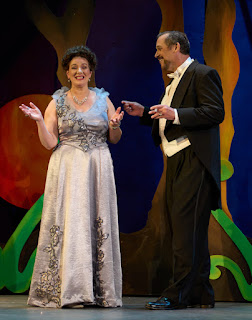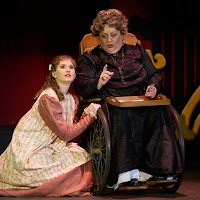In a 2016 interview at the Glimmerglass Festival, Stephen Sondheim said that he had always viewed his 1973 musical “A Little Night Music” as having “an operetta attitude.” It’s not surprising, then, that many opera companies have embraced it.
 |
| L-R: James Stevens, Leann Schuering, Eric McConnell, Jordan Wolk, Teresa Doggett Photo: Dan Donovan |
Union Avenue Opera’s production doesn’t just embrace the show; it makes love to it with a combination of sensuality and skill that even the curmudgeonly Madame Armfeldt (played with sardonic wit by Teresa Doggett) would appreciate. With a simple but highly functional set (C. Otis Sweezey), beautiful costumes (the multi-talented Doggett), skilled dramatic and musical direction (Annamaria Pileggi and Scott Schoonover, respectively) and, above all a splendid cast, this is the best “Night Music” I have seen in quite a while.
For those of you unfamiliar with the show, know that “A Little Night Music” is “suggested by” famed Swedish director Ingmar Bergman’s 1955 comedy “Smiles of a Summer Night.” The story centers on a collection of romantically confused couples whose foolishness is sorted out by the “smiles” of a single midsummer night, when the sun never sets and there’s both magic and pheromones in the air. Hugh Wheeler’s book adds a few complications and a bit more romance (“sex presented pastorally,” to quote Stephen Schwartz), but otherwise it sticks fairly closely to Bergman’s original.
 |
| L-R: Debby Lennon, Peter Kendall Clark Photo: Dan Donovan |
Presenting a successful “Little Night Music” can be a tricky proposition. Sondheim’s lyrics mix low comedy and high art in a way rarely seen on the musical stage, and his music is filled with intricate rhythms and layers of polyphony that are uncommon even in the regular operatic repertoire. That musical complexity is true as well for the roles of Frederik, Desiree, and Madame Armfeldt—originally written for singing actors rather than classically trained singers—which can be challenging.
What you need, in short, is a cast that can act as well as it sings, and vice versa.
Union Avenue has assembled just such a cast. Debby Lennon, a familiar presence on the operatic, theatre, and cabaret stages locally, is a wry and insightful Desiree Armfeldt, the actress who realizes that ending her earlier relationship with lawyer Fredrik Egerman might not have been a wise decision. Lennon is the kind of singer who sounds entirely at home in just about any musical genre, a fact she demonstrates here with a performance of “Send in the Clowns” that is simply the most heartfelt and musically solid I have ever heard.
Baritone Peter Kendall Clark’s Fredrik is funny and wistful, as he tries to negotiate a mid-life crisis of which he seems blissfully unaware. The role has generally been the province of big theatrical baritones like Len Cariou and Ron Raines, and Clark could not be a better fit. He’s got projection and tonal warmth to spare.
 |
| L-R: Leann Schuering, Peter Kendall Clark Poto: Dan Donovan |
Speaking of projection, bass-baritone Eric J. McConnell has ample vocal power as the “pea-brained” Count Carl-Magnus Malcolm, whose toxic masculinity is exceeded only by his lack of insight. He comes close to making the character’s vapid bluster a little too silly, but better to error in that direction than to let us see what a truly awful person Carl-Magnus is.
Soprano Leann Schuering, whose crystalline voice so brightened Union Avenue’s “HMS Pinafore” in 2018, sparkles again as Countess Charlotte Malcolm, painfully aware of just how much she is under her husband’s sadistic thumb but unable to find her way out.
I have, perhaps, exhausted my store of encomiums for soprano Brooklyn Snow from her previous UAO appearances. Here, as Fredrik’s very young and deeply shallow bride Anne (“unfortunately still a virgin” after nearly a year of marriage), she is once again vocally stunning and utterly convincing in her portrayal.
 |
| L-R: Amy Maude Helfer, Brooklyn Snow Photo: Dan Donovan |
Tenor James Stevens is Henrik, Fredrik’s son from his first marriage, who finds himself in the untenable position of studying for the priesthood while lusting after his stepmother who, after all, is around the same age as him. Steven’s performance is a perfect mix of pain and comedy, delivered with a clear-as-a-bell voice that fills the stage. Together with Snow and Clark, he makes the complex Act I trio “Now / Later / Soon” one of many memorable moments.
One sign of a solid show is the presence of first-rate performers in even the smallest roles. As the free-spirited and flirtatious maid Petra, mezzo Amy Maude Helfer brings an unusual touch of sadness to the final line of “I Shall Marry the Miller’s Son.” It’s there in the music, but I don’t recall hearing it before.
Arielle Pedersen, a finalist in last year’s Fox Performing Arts High School Talent competition, makes an auspicious UAO debut in the mostly non-singing role of Desiree’s daughter Fredrika, radiating warmth and wisdom beyond her years. Perhaps that’s the result of her tutelage at the feet (literally) of the wheelchair-bound Madame Armfeldt, continually disappointed by her daughter Desiree’s refusal to recognize the importance of the profit motive in her romances. She gives voice to it in the ruefully witty “Liaisons,” which Doggett, in one of her regrettably rare stage appearances, sings with impressive clarity, even though it’s at the bottom of her range.
 |
| L-R: Joel Rogier, Sarah Price, Phil Touchette, Gina Malone, Grade Yukiko Fisher Photo: Dan Donovan |
Finally, let us not forget the fine work by the vocal quintet that Sondheim employs as a kind of Greek chorus, commenting on the action and sometimes letting us hear the thoughts of the characters. Their presence is essential throughout the work and their music is often complex, as in the fugal “Perpetual Anticipation,” sung by the three women of the ensemble in Act II. The quintet consists of Joel Rogier, Gina Malone, Grace Yukiko Fisher, Philip Touchette, and Sarah Price.
That said, there are the usual issues with UAO’s overly resonant acoustics blurring overlapping vocal lines, especially in the Mozartian complexity of the Act I finale “A Weekend in the Country.” Schoonover’s tempos are also a bit too brisk in places for Sondheim’s lyrically lavish music, but the projected English text helps.
 |
| L-R: Arielle Pedersen, Teresa Doggett Photo: Dan Donovan |
Set changes were also longer than they should have been due to the necessity of hauling large pieces of furniture on and off stage. But this, again, is a function of the fact that the performance space has no backstage or wing space; there’s only so much you can expect a designer to do. “Falstaff” suffered from the same issue but at least this time Schoonover used bits of the score as change music, which made them feel shorter.
For me the bottom line is that it has been over a decade since I have seen a professional production of “A Little Night Music” and longer than that since I have seen one that was so completely right in so many ways. This is a “must see” for anyone who loves musical theatre of any kind.
There are two more performances this Friday and Saturday (August 26 and 27) at 8 pm at the Union Avenue Christian Church, 733 Union at Enright. Tickets are available at the UAO web site.
No comments:
Post a Comment